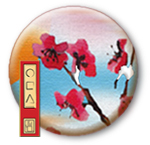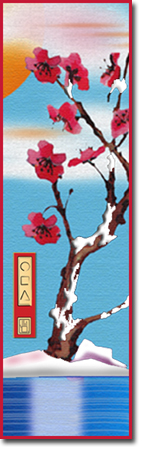On The Way: The Daily Zen Journal
A Boatload of Moonlight – Letters of Yuanwu
Yuanwu (1063-1135)
The early sages lived with utmost frugality, and the ancient worthies overcame hardships and lived austerely. They purified their will in this, forgetting food and sleep. They studied with total concentration and accurate focus, seeking true realization. How could they have been making plans for abundant food and fine clothes and luxurious housing and fancy medicines?
When it gets to the point where the path is not as good as in ancient times, then there is criticism that the wheel of the Dharma is not turning, and that the wheel of food is taking precedence. Because of this the Zen monasteries call their chief elders “meal-chiefs.” Isn’t this completely opposite from the ancient way?
Nevertheless, in the gate of changing along with conditions, we also carry out the secondary level. “On the northern mountain welcoming wayfarers from all directions, we look to the southern fields.”
This fall it happens that there is a big crop. We have asked you to oversee the harvest, and now that you are about to go, you have asked for some words of instruction, so I have told you about the foregoing set of circumstances.
What is important is to respect the root and extend it to the branches. This will benefit both root and branches and also illuminate the legitimate and fundamental task of people of complete enlightenment and  comprehensive mastery. If you work hard to carry this out, you will surely improve.
comprehensive mastery. If you work hard to carry this out, you will surely improve.
In general, to study the Path and seek out the Mystery, you must have a great basis in faith. You use this faith to believe in a deep sense that this matter does not lie in words or in any of the myriad experimental states. In fact, and in truth, the Path is right where you stand.
Put aside the crazy and false mind that has been concocting your knowledge and understanding, and make it so that nothing whatsoever is weighing on your mind. Fully take up this matter in your perfect, wondrous, inherent nature, which is fundamentally pure and quiescent. Subject and object are both forgotten, and the road of words and thoughts is cut off. You open through and clearly see your original face. Make it so that once found, it is found forever and remains solid and unmoving.
After that you can change your step and transform your personal existence. You can say things and put forth energy without falling into the realms of delusion of form, sensation, conception, evaluation, and consciousness. Then all the phenomena of enlightenment will appear before you in regular array. You will reach the state where everything you do while walking and sitting is all Zen. You will shed the root of birth and death and forever leave behind all that covers and binds you. You will become a free and untrammeled wayfarer without concerns—why would you need to search the pages for someone else’s dead words?
“There are ancestral teachers on the tips of the hundred grasses.” With these words, Jiashan pointed it out so people could become acquainted with it.
Kuanping said, “The great meaning is there in the fields.”
Baizhang extended his hands, wanting to let people know.
If you can become round and complete as a ripe grain of rice, this is the transmission of the mind-seal. If you still long for a peaceful existence, this will make you experience the first noble truth that suffering exists. But how will you say something about coming out of the weeds?
“A boatload of bright moonlight carries it back.”
Yuanwu (1063-1135)
Excerpted from Zen Letters – Teachings of Yuanwu – J.C. Cleary 1994





Yuanwu is best known for the very well-known collection of 100 public cases, The Blue Cliff Record, which in reality consists of notes taken from lectures he gave to his students who collected their notes and printed them out as block prints. He also maintained correspondence with many types of people, something unusual for the times in which he lived.
The letters are a more accessible form for people who have families or worldly careers. They are addressed to advanced practitioners and beginners. In the above selection, it appears he is addressing someone who has come to help the monastery with harvesting crops, but the heart of the message is fit for all of us.
The imagery of roots and branches is often used by Zen masters, and here it doubles as an image that would speak clearly to someone who works the earth for a living. What is the root or heart of practice? Rather than suggesting an answer, this seems to be more of a koan we all can ask ourselves. If you had to essentialize the heart or root of Zen for someone, what would you tell them?
Faith in the Way is vital for continuing our practice; as Dogen stated years after Yuanwu:
“It is imperative for those who practice the Way to believe in it. Those who have faith in the Way should know for certain that they are unfailingly in the Way from the very beginning—and are thus free from confusions, delusions, and disarray, as well as from additions, subtractions, and errors. Believing in this manner, penetrating the way thusly, practice it accordingly. Such is fundamental to learning the Way.”
You plant a seed and watch it burst from the ground, reaching for the light. You can rely on its wisdom. If you provide all the right elements and nourish this growth, it will come to maturity. In the same way, if we provide the elements of practice, our own growth will come to completion.
“You use this faith to believe in a deep sense that this matter does not lie in words or in any of the myriad experimental states. In fact, and in truth, the Path is right where you stand.”
Watching the budding plum trees,
Elana, Scribe for Daily Zen